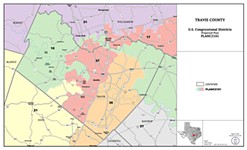Point Austin: See You in Court
This week the Supremes consider the curious habits of Texas politicians
By Michael King, Fri., Feb. 24, 2006

May I suggest a visit to the Web site of the D.C. law firm Jenner & Block (riveting company slogan, "When it's a Matter of Importance"), where you can find an accumulating mountain of links concerning the Texas congressional redistricting lawsuit, scheduled for argument this Wednesday, March 1, 1-3pm, before the U.S. Supreme Court. Jenner & Block partners Paul Smith and Sam Hirsch are among the lead attorneys for the plaintiffs, hoping finally to bust the state's and Tom DeLay's mad-dog re-redistricting map for Texas, and Smith (representing the "Jackson appellants," a long list of minority Texas voters, et al., among them Travis Co. Judge Sam Biscoe and Commissioner Margaret Gomez) is one of the two attorneys who will personally argue the case before the nine justices, including the two newbies, Chief Justice John Roberts and Justice Sam Alito. (Smith gets 40 minutes, followed by Nina Perales of the Mexican American Legal Defense and Education Fund, who gets all of 20, before the state, in the primary person of Solicitor General Ted Cruz, responds for its own hour.)
Two hours doesn't sound like much for the culmination of more than four years of legislative combat, a half-dozen regular and special sessions, two full-fledged flights to the border, and enough fevered political rhetoric to solve the natural gas crisis for the next decade. In fact, a Supreme Court oral argument is just the very small tip of a considerable legal iceberg, more apparent in the several dozen briefs accumulating on the Jenner & Block Web site (www.jenner.com, see "Resource Center" at lower left). (I'm told you can also find the documents at the Supreme Court site, but that one seems to be designed, like the Court itself, to prevent anyone but the legal cognoscenti from penetrating its veiled secrets.)
You could easily kill a weekend burrowing through these paper monuments. While it can be a slog at times, you can comfort yourself with the realization that what happens this Wednesday, and whenever the Court makes its decision, should determine a great deal about national politics for at least the next decade, and will inevitably weave Texas political and legal history, for good or ill, into the permanent fabric of voting rights law.
Welcome to Southwest Texas
I find this stuff endlessly fascinating, but then my family would hasten to point out that I enjoy watching particularly grisly surgical procedures on cable TV. Much of the briefs are repetitious, in that they rehearse the history, beginning with 2000 census (and looking backward to 1991), of how the Lege first punted to the courts to draw a congressional map, and then in the flush of the 2002 (TRMPAC-driven) Republican landslide, decided to go ahead and do it again, eventually over the fleeing bodies of desperate Democrats, followed by the partisan reversal of the congressional delegation and a host of lawsuits now arriving at the feet of the Supremes.
That history is recounted from radically different perspectives, of course. The plaintiffs' (approximately Democratic) briefs argue that the re-redistricting was impermissibly overpartisan and inevitably ran roughshod over the voting rights of minority Texans; the state (virtually Republican) briefs argue that excessive partisanship in the defense of candidates is no vice, and that in any event it enhanced minority voting rights be creating new "minority opportunity" districts in Houston and Central Texas. CD 25, now Austin Rep. Lloyd Doggett's district, is purportedly one of the latter, and Chronicle readers will be delighted to know that the state defends the "fajita strip" map of CD 25 by transporting us all to Southwest Texas. "And with respect to CD 25, which appellants describe with invective – 'absurdly misshapen,' 'absurdly noncompact,' 'far-flung,' and 'bizarre' ... the district court found that the elongated shape of new CD 25, like that of new CD 15 and new CD 28, is the direct result of unique Texas geography. ... [because] 'geography and population dispersion limit the availability of district compactness in the southern and western regions of the state.'"
See, they only cut us into three pieces and sent us scurrying in three directions because there weren't enough Austinites to go around.
Tyranny Not Constitutional
While that's entertaining, it isn't yet my favorite moment in this mountain of reading. Thus far that would go to former Houston state Rep. Ron Wilson's amicus curia brief, which is largely devoted (mostly via newspaper clippings) to demonstrating that although he was the sole and solitary African-American legislator to vote for the Republican map, he was undoubtedly the blackest of the bunch – seemingly fighting all alone for minority voting rights for many a long year. In all fairness to the since-trounced Wilson (by black voters), he does remind us bluntly of the time when the former Democratic dynasty (mostly now turncoat Republican) was as hostile to minority voting rights as the current regime. "In fact, because the African-American population of Houston would support it," he recalls, Rep. Wilson "had previously tried to secure an additional African-American congressional seat when his party controlled the Texas Legislature and the Governor's Mansion, but the Democrats would not draw one." As Martin Frost may be saying, what goes around ...
You'll also want to read the main NAACP brief, drafted in part by Austinites Gary Bledsoe and Robert Notzon, which recounts in detail how (despite what Wilson says) the new map effectively isolates and diminishes the voting rights of minorities all over the state; and the Austin/Travis Co. brief, by Renae Hicks, which considers the curious question of a map intentionally based on an outdated census, and what that does to the thoroughly established principle of one-man, one-vote. (Last week Hicks told me, "My gut feeling is, we're gonna win – but that's based on nothing but pure speculation.")
In closing, I'll offer a quote from the Jackson appellant brief, on the subject of effectively punishing minority Texans who insist on voting the wrong way: "Indeed, even outside the context of partisan favoritism, the Court repeatedly has held that a law motivated solely by a desire to harm an unpopular group of citizens is not a legitimate exercise of power under our Constitution." It's reassuring to know that's a practice frowned upon by the Constitution, at least in principle. ![]()
What happens this Wednesday should determine a great deal about national politics for at least the next decade, and will inevitably weave Texas political and legal history into the permanent fabric of voting rights law.
Got something to say on the subject? Send a letter to the editor.










